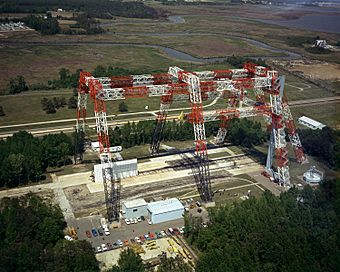Lunar Landing Research Facility facts for kids
|
Lunar Landing Research Facility
|
|

The site as the Impact Dynamics Research Facility (1974)
|
|
| Location | Hampton, Virginia |
|---|---|
| Built | 1965 |
| Architect | NASA |
| NRHP reference No. | 85002808 |
Quick facts for kids Significant dates |
|
| Added to NRHP | October 3, 1985 |
| Designated NHL | October 3, 1985 |
The Lunar Landing Research Facility was a special area at NASA's Langley Research Center. This center is located in Hampton, Virginia. Its main purpose was to help astronauts practice for Moon landings.
It used a large crane to hold a model of the Lunar Module. This model had a small rocket motor. It was suspended over a fake lunar landscape. This setup helped astronauts learn how to fly the real Lunar Module. They practiced the last 150 feet (about 46 meters) of their descent to the Moon's surface.
The facility was finished in 1965. It cost about $3.5 million to build. Twenty-four astronauts trained here. Famous astronauts like Neil Armstrong and Buzz Aldrin were among them.
The structure allowed astronauts to "fly" a full-size simulator. This was called the Lunar Excursion Module Simulator (LEMS). The LEMS hung from a huge A-frame gantry. This gantry was 200 feet (61 meters) tall and 400 feet (122 meters) long. An overhead crane moved the LEMS. Today, the LEMS is on display at the Virginia Air and Space Center.
What Happened After Apollo?
After the Apollo missions ended, the facility found new uses. In 1974, it was renamed the Impact Dynamics Research Facility (IDRF). It was then used to study how aircraft crash. This research continued until 2003. Due to limited money for upkeep, NASA decided to close it. They even planned to tear it down.
New Life for the Facility
In 2004, NASA realized the IDRF could be useful again. It could help with the Constellation program. So, it was reopened in 2005. This time, it was used for landing tests. These tests were for the Crew Exploration Vehicle (CEV) named Orion.
The facility was renamed again. It became the Landing and Impact Research Facility (LandIR). Some small changes were made to it. A new winch system was added. This system helped with full-scale Orion testing. Also, a new hydro-impact basin was built. This was a large pool for splashdown tests. It was located right under the gantry. The basin was finished in 2011.
Even after the Constellation program was stopped, the LandIR kept going. It continued to do impact testing. This is because the CEV will be used to visit the International Space Station.
The facility was recognized as a National Historic Landmark in 1985. This was because of its important role in space exploration.
See also
 In Spanish: Lunar Landing Research Facility para niños
In Spanish: Lunar Landing Research Facility para niños
 | DeHart Hubbard |
 | Wilma Rudolph |
 | Jesse Owens |
 | Jackie Joyner-Kersee |
 | Major Taylor |



